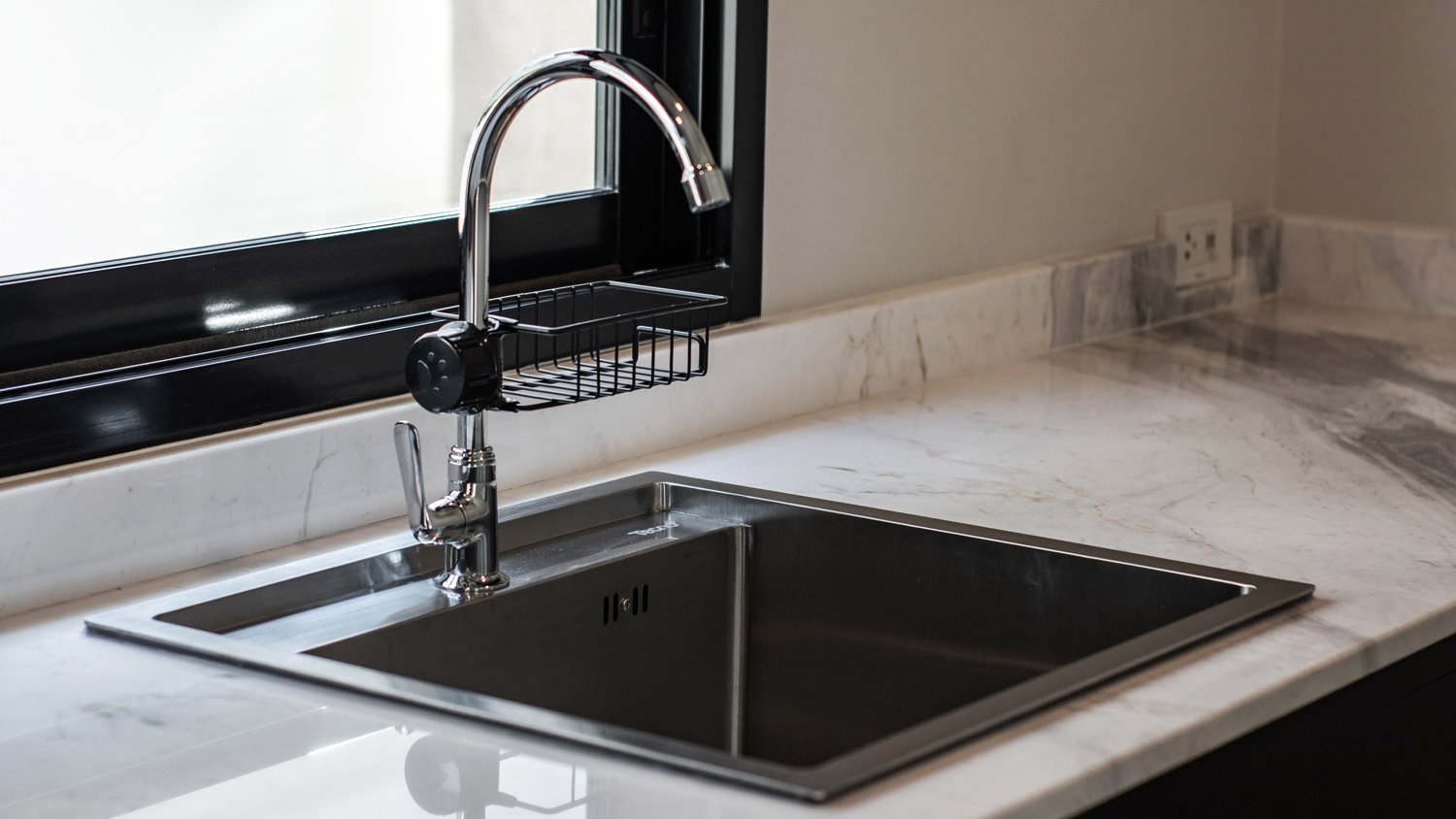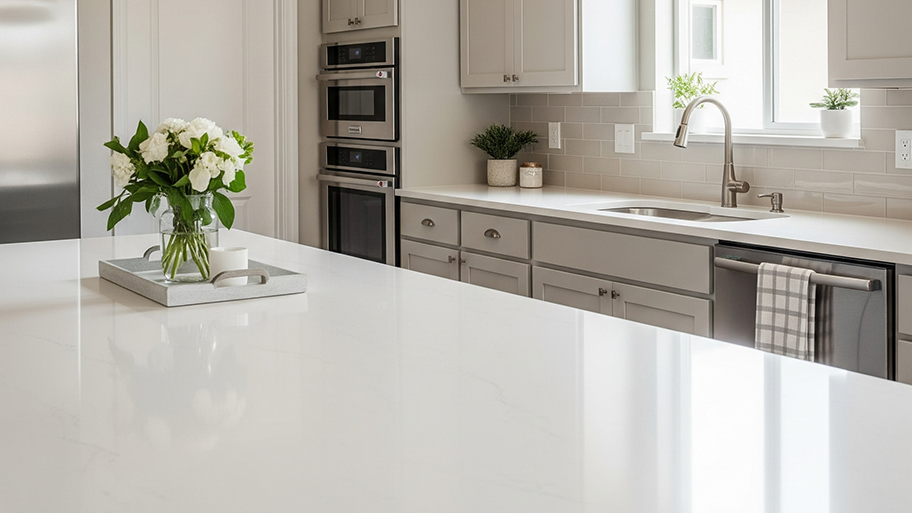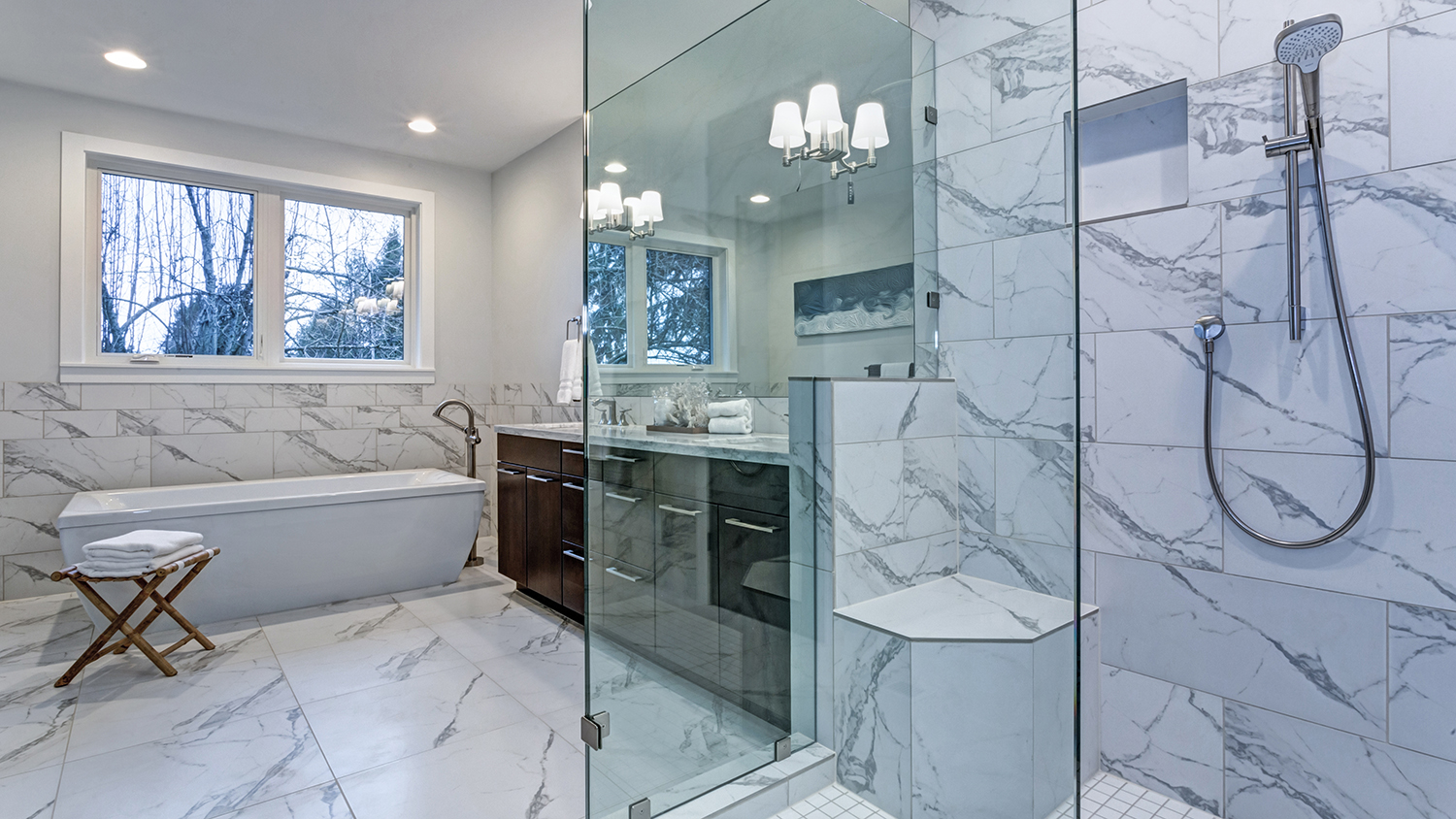
The cost of porcelain countertops is affected by many factors, primarily the material's type (tile or slab) and finish, as well as your counter’s size and shape.
The pros and cons of natural versus factory-made countertop materials


Natural stone and engineered stone countertops are both beautiful and durable.
Natural stone countertops are made from large slabs of granite, marble, or quartzite.
Engineered stone is man-made and uses natural or recycled materials.
While they may look similar on the surface, there are significant differences between engineered and natural stone. With so many options and variations, choosing among the list can feel daunting. Here, you will learn the differences between engineered stone vs. natural stone countertops to help make choosing one for your lifestyle, design preferences, and budget easier.

Engineered stone countertops are man-made countertops that combine natural materials with resins and pigments to create a countertop that mimics natural stone materials. Natural stone countertops are slabs of actual stone quarried around the world and then polished and cut to size. Both materials are strong and durable, but they have differences that may make one choice better for your kitchen than the other.
Engineered stone, or man-made stone, countertops are manufactured by mixing natural materials, like quartz or other minerals, with resins to bind them together and pigments to add color. Then, the manufacturer forms the mixture into slabs to create countertops. Engineered stone can be less expensive than natural materials and comes with many of the same qualities, including durability and stain and water resistance, but it may lack the natural variation and unique tonal differences of natural stone.
| Pros | Cons |
|---|---|
| Wide variety of styles | Only certain kinds can be used for countertops |
| Durable | More expensive than laminate |
| Can mimic the look of natural stone | Lacks the uniqueness of natural stone |
Best for:
Homeowners who want the look of natural stone without the cost
Families who use countertops for everything from cooking to crafts
Homeowners who want to choose from a variety of patterns and styles

Engineered stone countertops, also referred to as human-made stone countertops, are produced in a factory by holding crushed stone together with a resin binder.
Wide variety of styles: Since engineered stone is a factory-made product, you will find many colors, styles, and looks, many of which look like natural stone.
Durable: Engineered stone countertops are often resistant to scratches, heat, and acids. They are non-absorptive, making them low maintenance and easy to care for. Bonus: They do not need regular sealing.
Cost effective: Engineered countertops typically cost less than natural stone at $25 to $170 per square foot.
Engineered stone countertops are incredibly durable and often more cost effective than natural stone, but they may not provide the natural warmth and beauty of actual quarried stone.
You need to know what you want: Not all engineered stone can be used for countertops, so be sure to do your research.
Not quite the same: While many engineered stone countertops mimic the look of natural stone, they do not have the unique characteristics that come with natural materials.
Natural stone countertops are exactly what they sound like—slabs of natural stone polished and cut to size to create a beautiful, long-lasting countertop. Types of natural stone countertops include quartzite, granite, and marble, and they come in a wide range of colors and patterns, made all the more interesting because they are naturally occurring and not manufactured.
| Pros | Cons |
|---|---|
| Adds beauty and warmth to a space | Challenging installation |
| Long-lasting and durable | Requires regular maintenance |
| Sustainable | More expensive than other materials |
Best for:
Homeowners with a larger kitchen budget
Homes with a high-end aesthetic
Homeowners who want the unique patterns that natural stone offers

Natural stone, as its name implies, is produced in nature, created over thousands of years by water, wind, minerals, or lava, and extracted from a quarry.
It is hard to match the beauty and warmth created by nature. Natural stone countertops have a unique and luxurious look that most homeowners seek when creating a one-of-a-kind kitchen or bathroom.
Long-lasting and durable
Because natural stone is quarried from the earth versus produced in a factory, many consider it eco-friendly.
It may be cleaner. Depending on which stone you choose, you can usually get it as one solid piece, which means no grouting is needed and there are fewer places for bacteria to lurk.
Natural stone countertops are beautiful and durable, but they also come with some downsides related to installation, cost, and maintenance.
Installation challenges: In some cases, the cost to install a natural stone countertop can be higher than human-made materials because of the weight and size of the pieces.
Higher cost: Natural stone countertops are more costly than engineered stone or laminate countertops. This makes them a less ideal choice if you are trying to find kitchen countertop ideas on a budget.
Maintenance: Some types of natural stone are more prone to scratches and stains and need to be sealed regularly as part of their maintenance.
With many types of engineered stone countertops to consider, here are some of the most popular options:
If you are torn between quartz or granite, most granite is actually made from quartz. A mineral, quartz is an umbrella term for different types of engineered quartz. Most quartz countertops are produced in a factory.
Available in many colors, textures, and designs
Can contain recycled materials
Produced in different sizes, thicknesses, and edge profiles
Scratch, stain, and chip resistant
Difficult to differentiate among many different brands
Lacks the unique textures and tonal variations of natural stone
May have seams showing if you need multiple pieces
Can deteriorate over time
Not heat resistant
Corian® is a solid surface material, meaning it is human-made with the same composition from the inside out. DuPont Corporation offered it as a manufactured stone countertop replacement for marble, granite, and other higher-end materials, though other companies produce a similar product.
Easy to clean and maintain
Resistant to water stains and moisture
Seamless, as it is often produced in large sheets or slabs
More affordable compared to quartz or natural stone; Corian® costs $40 to $65 per square foot.
May not be as attractive to buyers as quartz or natural stone
Will scratch and chip easier than other types
Not heat resistant and thus prone to damage from hot pots
Sintered stone countertops are like quartz, but harder and less porous. Interior decorators and architects use this stone in kitchens, baths, and even floors. It is made from a variety of natural minerals in a process called “sintering,” which uses intense heat and pressure to transform the materials into a solid mass.
Extremely durable, resistant to scratches, heat, and discoloration
Available in a wide variety of colors, textures, and thickness
Harder than granite
Nonporous (does not require sealing) and easy to clean
Polished ends of the countertop have a different finish and texture than the top surface, as colors and textures do not carry through the entire thickness.
Chips and knicks, though rare, are difficult to repair.
Prices can be on the higher side compared to similar materials.
Natural stone countertops come in a wide range of colors and patterns and include quartzite, marble, and granite quarried from different areas.
The differences between quartz and quartzite are small but mighty. Quartzite is almost all quartz grains, while quartz is a mixture of quartz and resin that gives it a distinct style and color. Quartzite is usually white or gray.
More scratch resistant than quartz
Not affected by hot pots or dishes
No two pieces are alike.
Some quartzite is highly porous and should be sealed to prevent stains.
Limited color options
As a luxury natural stone, quartzite is more expensive than quartz at $70 to $200 per square foot.
Granite is among the hardest, strongest natural stones when it comes to countertop materials. It is also truly natural, which means that each granite slab will have unique fissures, swirls, and flecks of shiny iron bits.
Highly heat resistant, you will not have to worry about placing that Thanksgiving turkey or other hot pans on the countertop.
Virtually unlimited range of colors and pattern variations
At $40 to $100 per square foot, granite costs less than other natural stones.
Resistant to stains, bacteria, and dirt when sealed properly
Requires minimal maintenance and is easily repaired if damaged
Prone to staining if you do not seal the surface regularly
Can crack with sudden temperature change or sudden force
Finding matching colors when needed can be difficult
Should be cleaned with a special stone cleaner
Requires special tools and skills to cut granite countertops

Marble is a classic yet thoroughly modern luxury natural stone. Many homeowners debate between choosing either marble or granite, thanks to its timeless beauty and high-end elegance.
Every slab is unique with luxurious hues, veins, and designs.
Durable enough to cut veggies on the countertop without scratching
Higher-grade marble is heat resistant.
It may increase the value of your home.
Softer than other stones, which makes it susceptible to scratches and spills (clean up that coffee or wine right away)
At $40 to $180 per square foot, marble countertops are more expensive than most natural stone countertops.
Needs to be sealed regularly
While engineered stone and natural stone countertops share many of the same qualities, there are differences that can make one more appropriate for your kitchen than the other. Let’s take a look at some of the differences to help you decide whether you should go natural or lean toward a manufactured option.
While engineered stone does a good job at mimicking the natural colors and variations of natural stone, nothing can truly compare to the work Mother Nature does in creating materials over years and years of compression and heat. Natural stone wins for appearance.
Because engineered stone is manufactured, it comes with more options and opportunities for customization. Natural materials are quarried and then cut and polished, so while there are lots of patterns and colors to choose from, true customization is not an option.
Natural stone is incredibly durable, but it is still prone to scratches and not heat resistant. Homeowners should seal natural stone countertops periodically to enhance their ability to resist water and stains. Engineered stone, on the other hand, is highly resistant to scratches and stains and even heat and does not require sealing.
Both engineered and natural stone countertops are a more expensive option than laminate countertops, but one is more cost effective than the other. Engineered stone countertop costs typically range from $25 to $170 per square foot, while natural stone countertop costs start around $40 and can go as high as $200 per square foot.
Engineered stone and natural stone countertops are both very heavy. It can be difficult to cut them if you do not have the right tools or skills, so a professional should install both types of countertops. If you decide to use a remnant for a smaller section of countertop, you may be able to install it yourself, but make sure you are comfortable with the tools and process.
You can repair most engineered stone and natural stone countertops fairly easily by buffing them to remove any small scratches or imperfections, or filling larger cracks with epoxy and then sanding them until they are smooth again. If you sand natural stone, however, you should reseal it to prevent staining. Because engineered stone is nonporous, you never need to seal it.
You should seal natural stone periodically, depending on how much wear and tear it sees. Some homeowners seal their natural stone countertops yearly, while others may wait a few years in between. Engineered stone is nonporous and naturally stain and water resistant, so it does not need any maintenance other than regular cleaning with an all-purpose cleaner or dish soap and a cloth.
Both natural stone countertops and engineered stone countertops are highly durable and will last a very long time. Typically, manufacturers will guarantee engineered countertops for between 10 and 15 years, but they will last much longer than that. Natural stone gets the edge here, but only because it has been around long enough to know that it can last for 100 years or more. Engineered stone was invented in the 1960s, so time will tell if it can last as long as its natural counterpart.
The winner for sustainability depends on how you view sustainable products. Natural stone is a natural material with a relatively simple manufacturing process, making it a sustainable product made from a finite resource. Engineered stone, on the other hand, requires more manufacturing, but it is made from natural materials and often includes recycled materials.
While it is hard to predict the exact things that will make your home attractive to potential buyers, there are certain elements and amenities that have a good chance of doing just that. Natural stone is a luxury countertop material. It is expensive to purchase and install, but it can be a potential factor in upping the resale value of your home.
The decision between natural stone and engineered stone countertops comes down to budget, appearance, and durability—and there are trade-offs with each material. Natural stone can be more expensive than engineered stone, but there is really no substitute for the beauty of natural stone.
Engineered stone is incredibly durable and, in many cases, can mimic the look of natural materials. Both can create a beautiful kitchen and last for years to come. Talking with a stone countertop installation professional near you will help narrow down the options and see which fits best into your budget.
Installing kitchen countertops costs anywhere from $1,850 to $4,450, depending on materials, design, and size. Cheaper materials like ceramic break down to $1 to $15 per square foot, while something like granite costs $10 to $140 per square foot. Adding a specific treatment to corners and edges will also increase the price. Contractors charge around $300 to $500 per day for installation, plus $150 to $250 for additional crew members. You can expect labor costs to account for 10% to 20% of the total project cost.
Countertop longevity depends on how well it was installed, so go with a pro instead of attempting a DIY installation. Countertop contractors will ensure that the installation is completed perfectly with minimal hiccups. DIY installation may be appropriate for certain prefabricated builds and materials if you want to save some bucks, but we recommend leaving it to a professional.
From average costs to expert advice, get all the answers you need to get your job done.

The cost of porcelain countertops is affected by many factors, primarily the material's type (tile or slab) and finish, as well as your counter’s size and shape.

Marble countertops have yet to go out of style, and likely won't any time soon. This strong, durable, and stunning material melds with most kitchen, bathroom, and even dining room designs. But how much do marble countertops cost to install?

Silestone® has long been a favorite of homeowners who like the look of quartz. Budget for your Silestone® countertop’s cost with this helpful guide.

White quartz is durable, attractive, and low maintenance. Learn about the pros and cons of white quartz countertops to decide if they’ll work in your kitchen.

There are many types of granite countertops and colors to choose from, including blues, pinks, and greens. The right one can make a stunning statement.

Discover the true cultured marble cost for your next project. Learn about installation, size, labor, and ways to save on cultured marble.